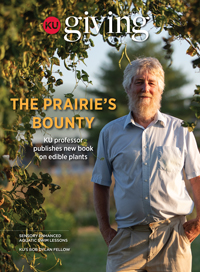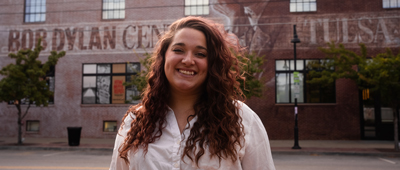KU Giving Magazine
Setting the Stage for Success
Valerie Gieler
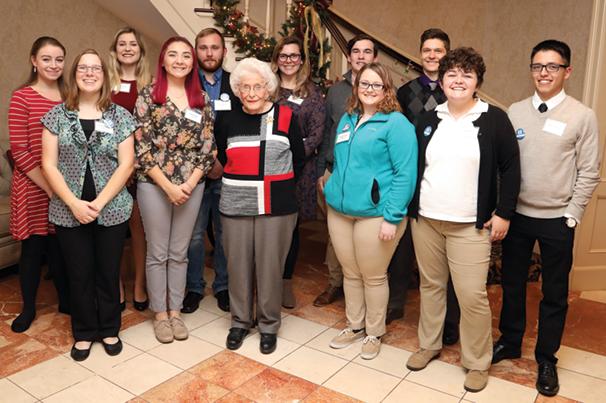
Hixson Opportunity Award helps students pursue their dreams
As a young girl, Edan Alemayehu Belihu took the journey of a lifetime — traveling 8,176 miles from her birthplace in Nazret, Ethiopia, to be reunited with her father in Kansas. Although Belihu was excited to see her dad after years apart, she also was terrified. She had recently lost her mother and didn’t speak any English. “I had high hopes for my future, but I often got frustrated because I couldn’t communicate with people,” Belihu said. “I was behind academically and felt I wasn’t capable of achieving my dreams.”
With a lot of hard work, adjustments and extraordinary support, Belihu graduated from high school in Shawnee, Kan., and is now a KU sophomore majoring in social welfare and pre-medicine. She plans to get a master’s in public administration and nonprofit management to help children in underserved communities receive health care and education.
A place to start
Belihu is just the type of student Christina Hixson hoped to benefit when she established the Hixson Opportunity Award with a $5 million gift in 2006. “I wanted to help everyday students — first-generation students who many times don’t think it is possible to obtain a college education,” Hixson said. “The scholarship provides a starting point, an opportunity for students to accomplish something that has not been a part of their upbringing.”
Hixson is the sole trustee of the Lied Foundation Trust of Las Vegas, Nev. The foundation was the principal donor for the Lied Center’s construction and is a longtime supporter of KU students. The Hixson Opportunity Award program selects 10 incoming freshmen each year for a $5,250 annual scholarship, renewable up to three additional years. Eligible students must be graduates of Kansas high schools who, because of personal or financial challenges, might not consider attending college. They also must show commitment to their education; the average GPA for scholars is 3.67. The need for this type of scholarship is evidenced by the 80 to 100 students who apply each year.
“I wouldn’t be able to attend KU without the Hixson scholarship,” Belihu said. “I am very grateful. It helps students like me who otherwise wouldn’t be able to dream big.”
Supportive community
Along with the funding, Hixson Scholars participate in a variety of support services provided by the Hixson Advisory Council, including mentoring, tutoring, peer discussion groups and the summer bridge program to get a jumpstart on their college careers.
For KU junior Bryan Vasquez, of Great Bend, Kan., the support is as important as the financial assistance. Vasquez was diagnosed with cancer at the end of his senior year in high school. “I knew I was supposed to take a break from my education, but I really wanted to keep going,” he said. This past summer, Vasquez was diagnosed with cancer recurrence. Although his GPA has suffered a little while he focused on his health, he is still on track to meet his goals, thanks in part to the encouragement from peers and advisers.
“The Hixson Scholars really is a community of students with a shared interest in succeeding,” Vasquez said. “Everyone who I’ve met through the program has helped me to be where I am right now. The help is phenomenal.”
Vasquez is majoring in biochemistry and is passionate about making health care more affordable through easy-to-use devices for health screenings that could replace expensive tests. “Ms. Hixson is making it possible for students’ dreams to be more attainable,” he said. “Words will never be able to show the gratitude I have.”
Evidence of need
Approximately 90 percent of Hixson Scholars are first-generation college students. All have been eligible for the Federal Pell Grant, and 90 percent of them have an expected family contribution (from the Federal FASFA form) of $0 — financial need is a consistent requirement for the award.
KU junior Hailey Solomon, of Oswego, Kan., said she knew early on that she would have to pay for college on her own, so she dedicated herself to schoolwork and community involvement, while also helping to care for family members with disabilities. “I was determined to become a person who was worthy of receiving scholarships,” Solomon said. “I also got my first job when I was 12 and immediately started putting a portion of each paycheck directly into my savings account.”
Sara Vancil, assistant director of financial aid and scholarships, has worked with the Hixson Scholars since the program began. In addition to the 10 scholars selected each year, three students from the pool of applicants receive scholarships of the same value — two receive the Wilt Chamberlin Opportunity Scholarship, and one receives the the Elizabeth Ann Hylton Scholarship. This leaves about 90 students annually who need to look for assistance elsewhere. And with the rising cost of tuition and room and board, the scholarship doesn’t cover as much of the costs as it used to.
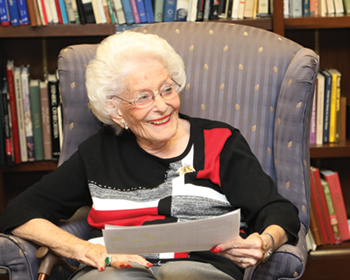
Christina Hixson
Photo by Lisa Scheller
Photo by Lisa Scheller
“The Hixson program has been transformational for the students involved and for KU, and we are so appreciative of Ms. Hixson’s generosity,” Vancil said. “Our challenge is that we don’t have enough scholarship funds for all the deserving students. We are always looking for ways to help more students.”
Benefits magnified
The program’s success is proven by a six-year graduation rate of 65 percent for Hixson Scholars, which is one percent higher than the overall KU graduation rate and 14 percent higher than the rate for first-generation students. The scholars are making positive contributions to our communities, too — graduates have gone on to earn advanced degrees, participate in service fellowships and have meaningful careers as lawyers, engineers, teachers, nonprofit event coordinators and pharmacists.
Christina Hixson is personally invested in the students and travels to campus each year to meet with them. She often tells students to listen to the person next to them because you can learn something from everyone you meet. “I’m always impressed at the varied interests and career aspirations the students have,” Hixson said. “They are very motivated to give back and help others.”
Because of the scholarship, Solomon is able to volunteer and advance her knowledge of civil engineering at the same time. She fell in love with construction work during a high school spring break community service trip and has volunteered with Habitat for Humanity, the Alternative Breaks program and Engineers Without Borders at KU.
“My long-term goal is to one day create an organization that constructs homes, bridges and water-treatment plants in developing countries,” Solomon said. “I will pay the kindness that I have received forward.”
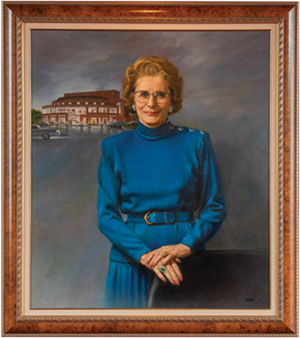
CHRISTINA HIXSON'S PORTRAIT IN THE LIED CENTER: Ernest F. Lied, a KU alumnus, established the Lied Foundation Trust and named Christina Hixson the sole trustee prior to his death in 1980. Hixson was hired as an assistant for Lied at the age of 17 and worked for him her entire career. Hixson has focused the charitable giving of the foundation on creating opportunities.
Photo by Mark McDonald
Photo by Mark McDonald
HIXSON SCHOLARS BY THE NUMBERS
10 scholars selected each year (out of 80–100 applications)
25 average ACT score, average GPA is 3.67
90 percent are first-generation college students
100 percent are eligible for the Federal Pell Grant
87 percent freshman to sophomore retention rate, compared with:
- 81 percent for all KU students
- 70 percent for first-generation students
65 percent six-year graduation rate, compared with:
- 64 percent for all KU students
- 51 percent for first-generation students
YOU CAN HELP
To create more opportunities for deserving students, contact Whitney Escalante at 785-832-7463 or [email protected].
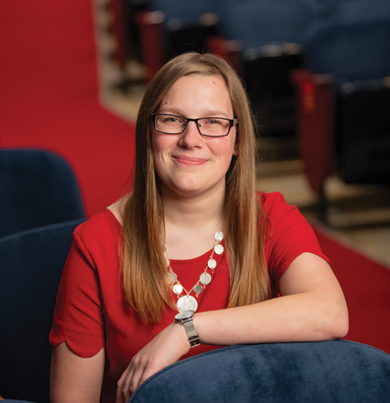
Photo by Mark McDonald
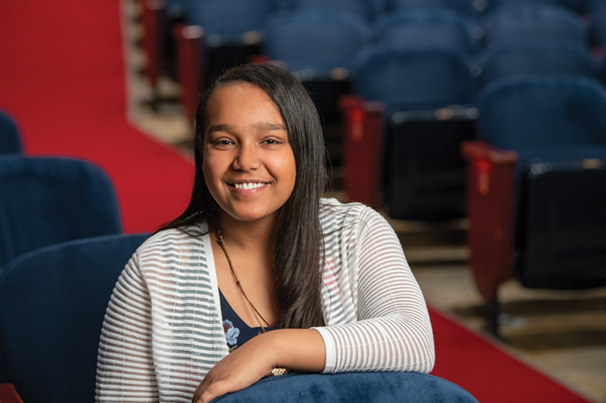
Photo by Mark McDonald
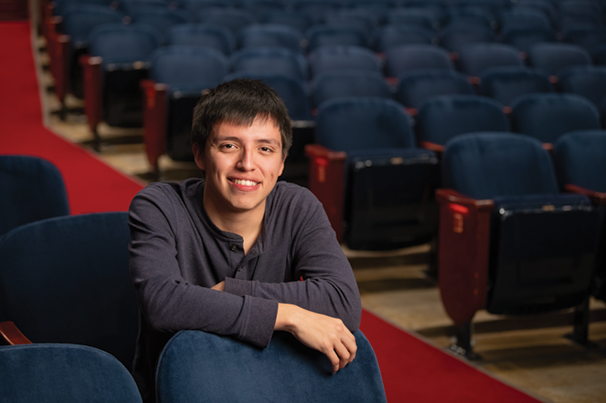
Photo by Mark McDonald

Photo by Lisa Scheller

